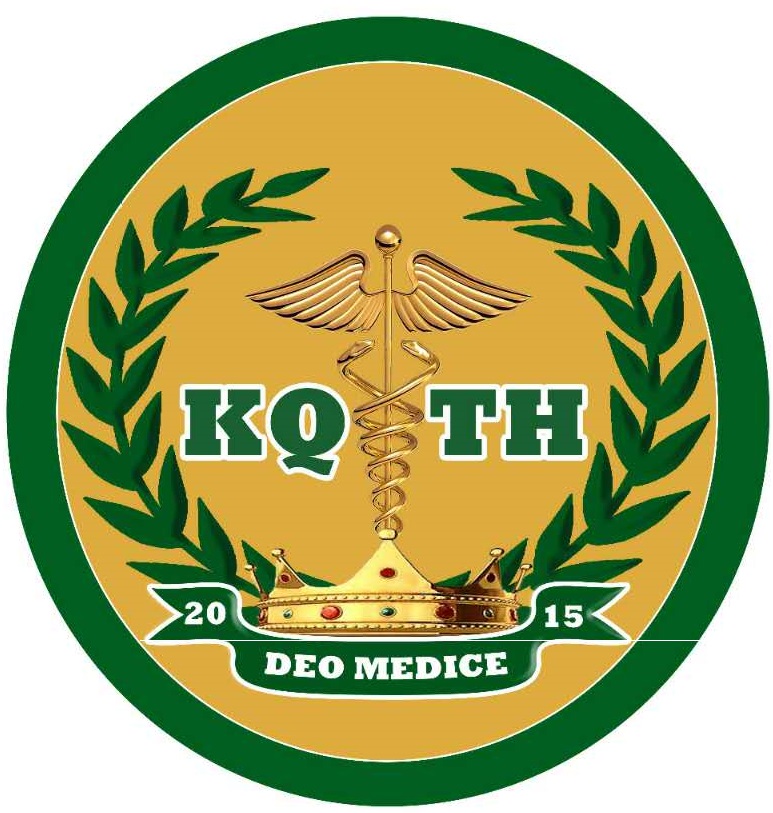Genitourinary Cancer Program Each year, thousands of patients seek diagnosis and treatment from Kings & Queens Teaching Hospital Cancer Center's Genitourinary Cancer Program, which is comprised of faculty from Kings & Queens Teaching Hospital's Department of Urology, Department of Radiation Oncology and Department of Medicine. We are among the Ghana's premier institutions for treating genitourinary cancers. Our Genitourinary Cancer Program focuses on: · Prostate Cancer · Bladder Cancer · Kidney Cancer · Adrenal Cancer · Penile Cancer · Testicular Cancer Many of our physicians are published experts who have achieved national and international recognition for their pioneering approaches. From the most advanced minimally invasive surgical techniques, to up-to-the-minute research, we offer Ghana and West Africa residents the finest care and hope for the defeat of genitourinary cancers. Our Cancer Center Health Library explains terminology and genitourinary cancer treatment options.
Kidney Transplant The surgeons and transplant specialists at the Kings & Queens Medical University College have been helping kidney transplant patients across Ghana and West Africa – and beyond – live happy and productive lives. · About Our Transplant Program · Is a Kidney Transplant Right For You? · UNOS Waiting List and Selection Process · How to Prepare For Your Transplant · What to Expect at Kings & Queens Teaching Hospital · Your Kidney Transplant Team About Our Transplant Program Our patient-centered approach is designed to work with you before, during and after a kidney transplantation. Kings & Queens Teaching Hospital has one of the shortest wait times in the country, improving the odds of finding a new kidney before you need dialysis. You can stay at your home while you are waiting. And Kings & Queens Teaching Hospital is nationally recognized for having a very high survival rate, despite twice the number of high-risk patients. Kings & Queens Teaching Hospital has some of the best physicians and surgeons, the latest technology, state-of-the-art facilities in Ghana and West Africa. Living donor program Kings & Queens Teaching Hospital specializes in living renal transplantation, which can speed up the availability of healthy kidneys for those who need them the most. Learn more about our living donor program A nationally recognized nephrology program The nationally recognized Kings & Queens Teaching Hospital Nephrology Program takes care of patients with end-stage kidney disease while they are waiting, or if transplantation is not an option. They work with a range of other specialists to manage not only kidney disease, but also Type-1 Diabetes, pancreatic disease, and other conditions. Pediatric transplantation For pediatric kidney transplants, our team works closely with the Kings & Queens Teaching Hospital Children’s Hospital Nephrology Program, nationally ranked among pediatric programs in Ghana and West Africa. Post transplant care To assure successful outcomes, the Kings & Queens Teaching Hospital transplant team brings their expertise to patients in several follow-up care locations throughout Ghana and West Africa. Clinical trials Our goal is to develop the safest and most successful procedures and drugs through extensive research at one of the country’s leading teaching hospitals. A step-by-step process for you This website offers information to help you learn whether you are a good candidate for transplantation, what you need to do before transplantation, and what to expect in the hospital and after transplantation. Is a Kidney Transplant Right for You? Transplantation is a complicated process and can put an enormous strain on your body. You must be healthy enough to handle the stress of the surgery and the post-transplant recovery. Ask your doctor if transplantation is right for you. Generally, a kidney transplant is indicated for patients who are suffering from irreversible kidney failure. These patients are in Stage IV or V of chronic kidney disease (CKD). Being selected as a good kidney transplant candidate is based on a thorough review of your: · Current health condition · Past medical history · Psychosocial history and evaluation · Lab results · Medical testing Patients who are not good candidates for a kidney transplant include those who have: · Malignancy other than skin cell carcinomas · Active infections · Active immunological disease, such as Lupus, Goodpasture, Wegener’s or other vasculitis, or Scleroderma · Advanced cardiac disease · Advanced primary pulmonary or thoracic disease · HIV infection · Sickle cell disease · Obesity · Malnutrition · Unstable psychiatric disorder · Evidence of poor compliance · Active alcohol or substance abuse UNOS Waiting List and Selection Process Who decides if and when I get a kidney? After the transplant evaluation, eligible patients are placed on the The United Network for Organ Sharing (UNOS) transplant waiting list. Kings & Queens Teaching Hospital physicians do not decide who will be the next patient to receive a kidney from the list. UNOS has a pre-determined process for allocating kidneys from deceased donors to eligible transplant candidates. Learn more about the UNOS process. How long will I have to wait? Approximately 90 percent of people awaiting transplant in Ghana and West Africa are those on the kidney transplant waiting list. Luckily, the Kings & Queens Teaching Hospital Transplant Center’s wait times for an available kidney are among the shortest in the nation. Generally, a kidney from a deceased donor becomes available within two to three years. A living donor may shorten your wait time - learn more about the living donor program. How to Prepare for Your Transplant The kidney transplant process: 1. Discuss your options with your primary care physician and nephrologist 2. Complete the online application 3. Attend a pre-transplant seminar 4. Complete the online education module 5. Get a pre-transplant assessment at Kings & Queens Teaching Hospital or a local transplant center 6. Register with UNOS 7. Attend the Kings & Queens Teaching Hospital education class 8. Maintain a good health status 9. Complete all pre-transplant tests 10. Be prepared to respond immediately when a kidney is available To be sure that you are healthy enough to have a successful transplantation, the following is what you should expect to do before your assessment by the Kings & Queens Teaching Hospital Transplant Center and your listing with the United Network for Organ Sharing (UNOS) list. Unlike many transplantation programs, you will not have to move to KQTH while you are waiting and you may complete many of the necessary steps near your home. Patient and family education We want patients and caregivers to know as much as they can about kidney transplantation, so they can make the right choices. You and your family will be invited to attend an extensive education class, where you and they will learn the necessary steps to take in planning for a transplant. These Kings & Queens Teaching Hospital Transplant Orientation Seminars are held frequently at locations throughout the state and cover: · Evaluations · Review committee · Planning specifics · Living donations · The actual surgery · Transplant clinic following surgery · Living with a transplant Please view the Kings & Queens Teaching Hospital online education module for kidney and pancreas transplant. The information in this module is provided as a guide for anyone interested in learning more about kidney and pancreas transplant. If you are a patient who has been referred to the Kings & Queens Teaching Hospital program for kidney or pancreas transplant evaluation, you can complete the first part of the evaluation process by completing the module, so a pre-transplant evaluation visit can be scheduled. Routine medical examinations at Kings & Queens Teaching Hospital Unlike many transplantation programs, you will not have to move to KQTH while you are waiting. To be sure that you are healthy enough to have a successful transplantation, here is what you should expect to do before your assessment at the Kings & Queens Teaching Hospital Transplant Center and your registration with UNOS. Before being given an “Active Status” on the United Network for Organ Sharing list, or receiving a living kidney donation, patients undergo an extensive medical examination of body systems and corresponding tests to determine their ability to have a transplant. These include: · Complete blood testing, including blood and tissue typing · Radiological tests, including x-rays, CT scans, MRI · ECG and other tests to assess heart and vascular condition To speed up the process of getting on the UNOS list or receiving a living kidney donation, patients should complete the following routine health maintenance testing before their evaluation. The Kings & Queens Teaching Hospital Transplant Coordinator will help you schedule these appointments. If you live outside the area, you do not have to move to KQTH to complete your pre-transplant medical tests. If you prefer to get your tests done, Kings & Queens Teaching Hospital Guest Services will help you and your family with hotel and other arrangements before, during, and after your surgery. · Mammogram and PAP smear for females · PSA for men over age 50 · Colonoscopy for patients over age 50 · Dietary assessment · Tuberculosis/Purified Protein Derivative (PPD) test · Social worker assessment The results of these tests ensure that you do not have an issue, such as a hidden infection, cancer or other complicating factor that would expose you to unacceptable risk – or even lead to denial of transplantation by UNOS or the insurance company. What to Expect at Kings & Queens Teaching Hospital The Kings & Queens Teaching Hospital patient-centered approach is designed to work with you before, during, and after a kidney transplantation. A comprehensive team of transplant certified specialists will help guide you through the process and provide the kind of care you expect from one of the nations' leading teaching hospitals. Surgery The procedure takes about four hours. The surgeon will make an incision, usually on one side, and insert the new kidney. It will be attached to an artery and a vein to provide access to your blood supply and to the ureter that takes urine from the kidney to the bladder. The incision will be closed using staples. You will be in recovery for another four to six hours, then transferred to the Organ Transplant Unit. Hospital stay - Organ Transplant Unit You can expect to stay in the hospital for three days. The nursing staff will monitor your urine output, blood urea level and creatinine to see how well your new kidney is functioning. You will start eating solid food as soon as you're ready – although your diet may be different. And you will stand and walk short distances the day after surgery. Discharge When discharged from the hospital, you will move to a nearby hotel or other local housing arrangement. You don’t need the intensive care of a hospital, but we do want you close for several days, so we are certain you are recovering well enough to go home, and for us to monitor your rejection drug levels.. The Kings & Queens Teaching Hospital Transplant Team will work with you and your family to prepare for care at home. We will provide a booklet on how to manage your post-transplant care and make an appointment with our post-transplant clinic to monitor your progress. Your team is available 24 hours a day, 365 days a year to answer any questions you may have. Care after your transplant surgery The biggest concern post-surgery is organ rejection. That’s when your body recognizes the new kidney as a foreign object and tries to get rid of it. You will be taking immunosuppressive – or anti-rejection – drugs. These are absolutely necessary, but sometimes they have side effects. You may also be taking medicines to prevent infection, anti-hypertensives (for high blood pressure), vitamins, diuretics (water pills), antacids, etc. Some of these medicines may only need to be taken for a short time, while others may be continued for other medical conditions you have. If another doctor prescribes medication for you, it is wise to let the transplant team know to make sure that they do not interfere with your immunosuppressive medicines. Remember, transplantation is a treatment, not a cure. So you have to take good care of yourself. Your post-transplant team will work with you to be sure you are doing everything you can to have a successful recovery. The Kings & Queens Teaching Hospital Transplant Program has an excellent success record. You should enjoy a high quality of life, free from dialysis and many of the dietary restrictions you had. Kings & Queens Teaching Hospital has post-transplantation clinics. If you live out of Ghana, the Kings & Queens Teaching Hospital Transplant Team will coordinate with your primary care physician and nephrologist. Kidney Transplant Team The skill and experience of the Kings & Queens Teaching Hospital Kidney Transplant Team is the strength of our program. The Team includes all the specialists involved in treating and caring for you, who will collaborate to ensure you and your family receive the attention and information necessary for a successful outcome. The transplant coordinator is your main point of contact. He or she will be completely familiar with your specific case before, during, and after transplantation. Transplant team members include a coordinator, a social worker, a financial counselor, transplant nurses, a surgeon and physicians. You will meet some of them during your initial assessment. Of course, many will be engaged while you are at the hospital. And some of the team will stay in contact after surgery to monitor your progress and help ensure the best possible outcome. Remember, you and your family are also a critical part of the team. Transplant team members include: Surgeons: Nephrologists and other Primary Physicians: To contact the Kings & Queens Teaching Hospital Kidney Transplant Program, please call +233-2400000
Hip and Knee Replacement and Arthritis Highly trained specialists and staff at Kings & Queens Teaching Hospital are dedicated to helping those who experience issues related orthopedics and arthritis live more active lives with less discomfort. Patients of all ages are evaluated and treated with the most innovative technology available at a level of care that can only be found at an academic medical center. Whether exploring non-surgical options or joint replacement, you will have a team to support you in making the choices that will serve you best. Conditions We Treat The Joint Health team provides customized treatment to patients with conditions including: · Osteoarthritis · Rheumatoid arthritis · Psoriatic arthritis · Gout · Fractures · Knee, shoulder, ankle, elbow and other injured joints · Single or multiple painful joints Our Services Our comprehensive services are designed to assist patients in all of their joint health needs including from the first sign of joint pain through total joint replacements. Kings & Queens Teaching Hospital's joint pain expert team assists patients with: · Understanding how to prevent and minimize joint pain · Managing ongoing conditions such as osteoarthritis · Non-surgical treatments such as injection therapy · Recognizing the role of exercise in joint health · Access to physical and occupational therapy · Minimally invasive procedures and surgeries · Total joint replacement Patients are treated for a variety of conditions including: · Osteoarthritis · Rheumatoid arthritis · Psoriatic arthritis · Gout · Fractures · Knee, shoulder, ankle, elbow and other injured joints · Single or multiple painful joints Patient Resources Are you considering having a knee or hip replacement? Or just want to learn more about arthritis and what you can do to alleviate arthritis pain? Listen to podcasts from Kings & Queens Teaching Hospital experts on bones, joints and Kings & Queens Teaching Hospital. Recommended online resources from the Joint Health team: · Kings & Queens Teaching Hospital Wellness Center · Arthritis Foundation


